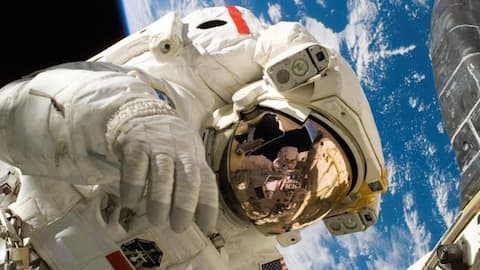Astronauts experience altered food perception in space, study finds
What's the story
A pioneering study conducted by scientists from RMIT University on July 16 and published in the International Journal of Food Science and Technology has revealed that astronauts frequently perceive food tastes and smells differently in space.
The research attributes this change to microgravity, which causes bodily fluids to shift towards the head.
The study included a large sample of 54 adults to explore how individuals experience aromas and tastes in isolated settings, capturing a wide range of personal variations.
VR technology
Virtual reality aids understanding of spacecraft food perception
The study utilized virtual reality (VR) technology to comprehend how the spacecraft environment influences human perception of food.
Researchers found that astronauts' perception of the same meal differs in space compared to on Earth, primarily due to nasal congestion caused by fluid shifting in weightlessness.
Eating, a multi-sensory experience involving taste, smell, texture, color, and touch, is disrupted in space when any of these senses is dulled.
Consequently, astronauts' enjoyment of food changes.
Emotional status
Psychological factors influencing astronauts' eating experience in space
Many astronauts report a decrease in their enjoyment of eating while in space.
The unfamiliar environment of space, coupled with stress, confinement, loneliness, and a limited variety of food available, contributes to the disruption of the multi-sensory eating experience.
Dr. Julia Low, co-lead researcher from the School of Science, suggested that increased feelings of loneliness and isolation might influence how isolated individuals perceive the aroma and taste of food.
Benzaldehyde
Benzaldehyde's impact on aromas in space simulation
Associate Professor Jayani Chandrapala, a food chemistry expert from RMIT and co-researcher, emphasized that benzaldehyde, a common chemical compound found in vanilla and almond, significantly influenced how aromas were perceived in the ISS-simulated environment.
The study revealed that vanilla and almond scents intensified in the VR setting, while lemon scent remained unchanged.
The findings contribute to understanding how space conditions affect sensory experiences and could inform future considerations for space mission food development.
Adaptations
Special adaptations for food and beverage preparation on the ISS
Astronauts customize their tea and coffee preferences before launch, as they can only add hot water to their pre-specified blends without options for creamer, sugar, or sweeteners.
To ensure safety, salt is dissolved in water and pepper is provided in a food-grade oil, minimizing the risk of inhalation or accidental eye contact.
Each astronaut receives a personal utensil pack containing a knife, fork, spoon, and scissors.
With no kitchen sink or dishwasher available, utensils are cleaned using wipes after meals.
Induction
Induction cooking in space
In space, cooking typically involves injecting hot water into pouches, although earlier methods on the space shuttle included using a convection oven to warm irradiated meals with hot air.
The International Space Station (ISS) has since upgraded to include an induction oven.
Researchers have recognized that food serves a crucial role beyond mere sustenance for astronauts—it significantly impacts their mental wellbeing and can provide a comforting reminder of home.
Food cooler
Innovative cooling solutions for food and beverages on the ISS
There's no conventional food freezer on the ISS, but there is MERLIN.
The cooler, designed for scientific experiments, maintains suitable temperatures for storing food and beverages on the ISS.
It ensures the crew's dietary needs are met and also chilled beverages and food items as required, showcasing the station's innovative approach to sustaining life in space's challenging conditions.
